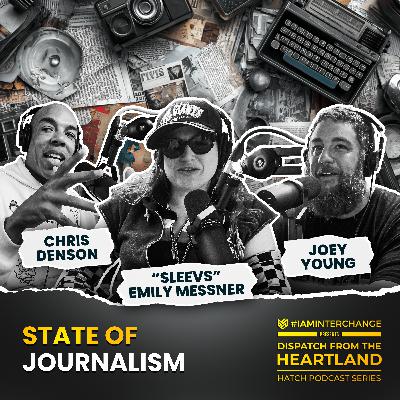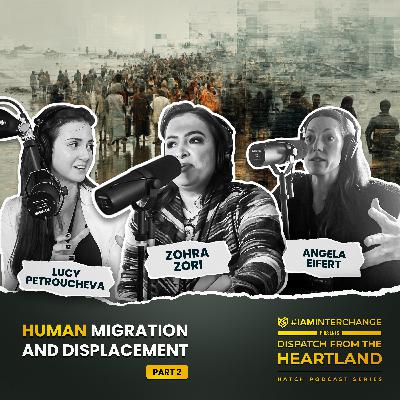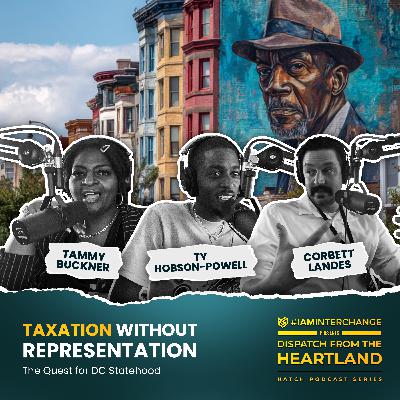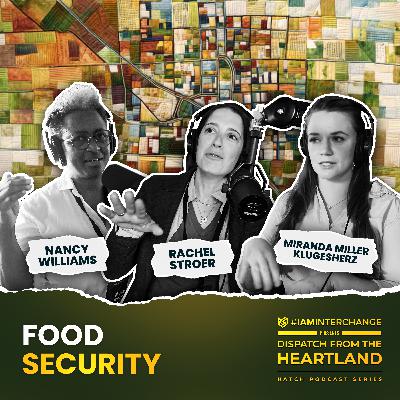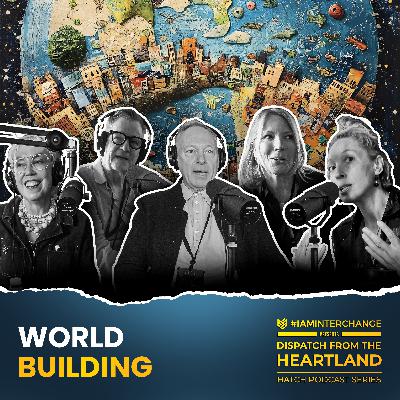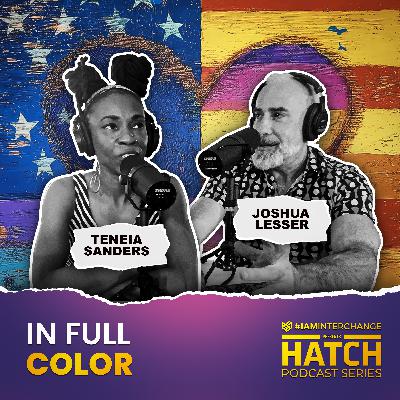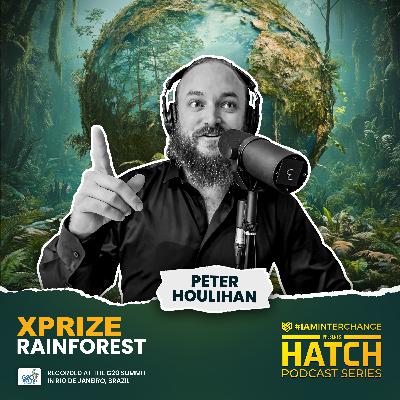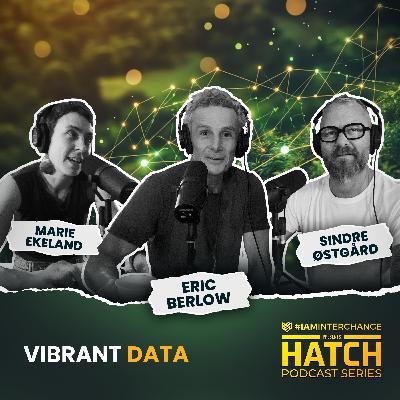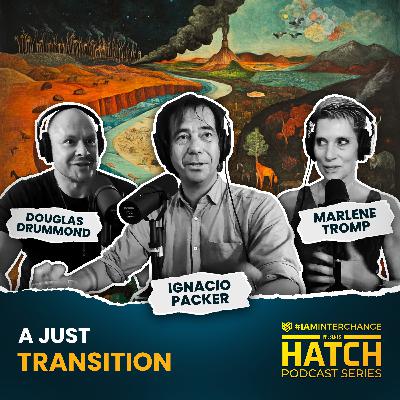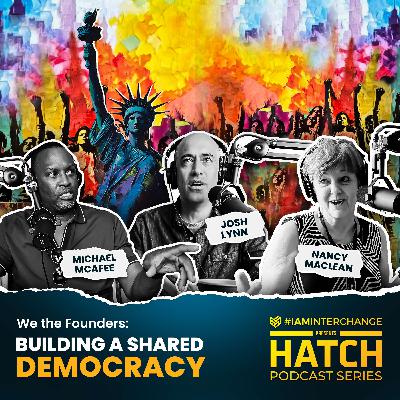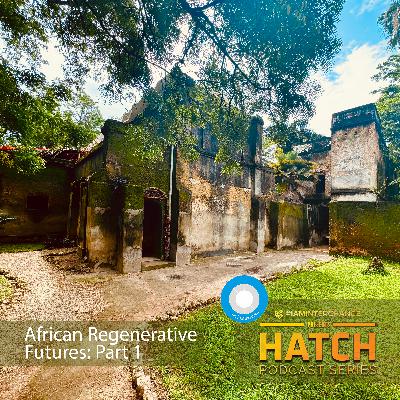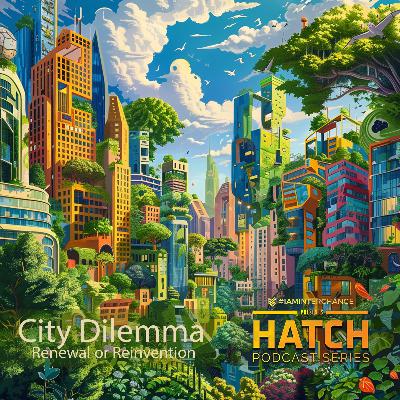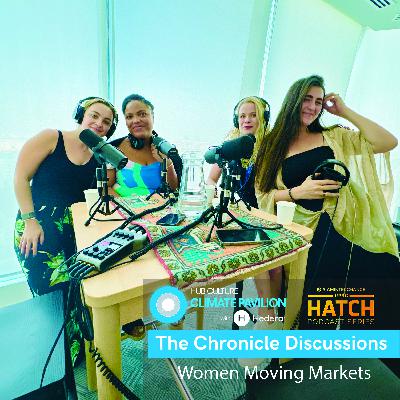Discover I Am Interchange
I Am Interchange

I Am Interchange
Author: Tate Chamberlin
Subscribed: 11Played: 55Subscribe
Share
© Copyright 2023
Description
I Am Interchange immerses you in the world of adventure journalism, where we fearlessly explore the monumental global changes, inequalities, and urgent issues surrounding the UN Sustainable Development Goals. Through raw, unfiltered storytelling, we dive into the tension within these goals and share the stories from the front lines of systems change.
102 Episodes
Reverse
Once upon a time, journalism started with a letter nailed to a tree—or a door. Some declaration, some warning, some truth someone wanted heard. And people would gather in the square to listen. News wasn't just information; it was a shared experience. Then came the daily paper. Then the evening broadcast. News once a day—steady, dependable. Until it wasn't. Now it's constant. Twenty-four hours. Push notifications. Feeds that never stop refreshing. And somewhere in all that, we started to wonder—what's the difference between fact and opinion anymore? Between storytelling and spin? In this episode, Tate Chamberlin talks with "Sleevs" Emily Messner, Joey Young, and Chris Denson about the evolution of journalism—from editorial boards and ad sales to freelancers, podcasts, and algorithms. How we depict what's true, and whether journalism can still sustain itself. Because while we were putting this episode together, the press corps was literally packing up and leaving the Pentagon—a small headline that somehow says everything about where we are right now. So… is there a future in journalism? Or do we have to make one, even if there isn't? It's Dispatch from the Heartland, join us, won't you?
Here's the thing about leaving. Sometimes you plan it for years — a better job, an education, a shot at something bigger. Other times it happens overnight. Governments fall. Food disappears. You run. This episode of Dispatch from the Heartland is about human migration and displacement — one of the oldest patterns of our species. Moving for survival. Moving for hope. Moving because staying is no longer possible. It's trauma. It's hope. It's a blank page. In this episode, Tate Chamberlin sits down with Zohra Zori, Lucy Petroucheva, and Angela Eifert to talk about displacement, belonging, and the slow learning curve of new cultures. We'll look at the mistakes, the forgiveness, and the "othering" that happens when you're new. We'll talk about refugee camps that stretch on for years, the difference between sustainability and dependence, and the unspoken emotions you carry when you leave everything behind. This is a space for vulnerability. For beginning again. For understanding sovereignty even when choice has been stripped away. Because right now, families are uprooted. Cultures are colliding. Dreams are being carried across borders. And even in movement — even in loss — we hold on to the hope of a better life. This is Dispatch from the Heartland. Join us, won't you?
Washington, D.C. isn't just a backdrop of monuments and marble. It's a living, breathing city—home to more than 700,000 people who work, who raise kids, who build their lives here. Known for decades as Chocolate City, D.C. carries a proud history of Black culture and resilience. And yet, unlike every other city in the United States, its residents watch democracy without fully taking part in it. They pay billions in federal taxes. They serve in the military. And still, they live under taxation without representation—the very injustice that fueled the Boston Tea Party and launched the American Revolution. More than two centuries later, the capital of the United States remains the only city where that founding demand is still denied. And here's the twist—this federal district is saturated with law enforcement. Dozens of agencies with arresting authority overlap in the same small space: the Metropolitan Police, Capitol Police, DEA, FBI, Secret Service, Park Police, Transit Police. And more recently, the National Guard and ICE. A city layered with power, yet stripped of the most basic power its people should hold—the right to representation in Congress. This is Dispatch from the Heartland. In today's episode, Ty Hobson Powell brings urgency and fire to the fight for DC statehood, making the case to Corbett Landes and Tammy Buckner that it's time for the capital to finally become the 51st state. This isn't just politics. It's about identity, equality, and the unfinished promise of democracy in the United States. We're at Arbor Day Farm in Nebraska—join us, won't you?"
A vacant lot, once overlooked and forgotten amid the rush of urban life, now pulses with vibrant life—flowers bloom where concrete once stood, vegetables sprout in neglected corners, and hope takes root in every crack. Yet, even these transformed spaces remain fragile—vulnerable to neglect, gentrification, or future development that could erase their resurgence. Similarly, rural farmland faces its own challenges—fragile soils, unpredictable weather, and the razor-thin margins that make farming a constant gamble. While innovative crops like perennial wheat show promise for creating more resilient and sustainable agriculture—reducing the need for replanting and conserving water—convincing farmers to take risks with such unproven techniques remains a significant hurdle. It's a story of resilience—rooted in the earth and driven by community spirit—connecting urban renewal with rural perseverance in the shared pursuit of food security and sustainability. Today, we're sharing stories of communities confronting climate change, dismantling systemic barriers, and working tirelessly to ensure equitable access to healthy food—because food security is fundamental to a thriving society. Tate Chamberlin is joined by Nancy Williams, Founder of No More Empty Pots, Rachel Stroer, President of the Land Institute, and Miranda Miller Klugesherz, Executive Director of the Kansas Food Action Network. Together, we'll reflect on personal experiences, systemic issues, and the collective power driving meaningful change. We're at Arbor Day Farms in Nebraska—join us, won't you?
Beneath the surface of our planet's icy crown lie stories of ancient times, fragile ecosystems, and communities woven into the glaciers' icy embrace. These frozen giants—part of the cryosphere, the world's vast frozen regions—are more than just stunning landscapes; they are vital sentinels of our climate's health and the future of life on Earth. Yet, they are melting away before our eyes, especially the tropical glaciers that are vanishing faster than anyone expected. Today, Tate Chamberlin explores this icy world with Marcela Fernandez. We'll uncover why glaciers and the cryosphere matter beyond their breathtaking beauty—why they are essential to life, culture, and the stability of our climate. And most importantly, what we can do—together—to ensure these vital ecosystems don't disappear forever. It's a story that doesn't roar, but whispers—calling us to listen, to act. We're at the World Oceans Summit in Nice, France. Join us, won't you?
Imagine a city alive with stories—every corner whispering tales of dreams, struggles, and aspirations. It's a place where communities don't just live, but co-create their surroundings, weaving narratives into the very fabric of their environment. This is the essence of World Building—where storytelling becomes a force for transformation, turning visions into tangible realities. Today, we step into that world. Host, Tate Chamberlin, is joined by an incredible lineup of guests: visionary designer and storyteller Alex McDowell, urban innovator Meegan Elliot, systems thinker Mark Beam, artist and storyteller Ash Eliza Smith, and community builder Jenn Stein. Together, we'll explore how world-building shapes not only our imagination but also the spaces we inhabit—and how, through collaboration and imagination, we can craft a future worth imagining. It's Dispatch from the Heartland. Join us, won't you?
In this podcast, host Tate Chamberlin is joined by internationally acclaimed musician Teneia Sanders and Rabbi Joshua Lesser in discussion about queer community, pride, and the perspective necessary to walk, hand in hand, through an increasingly hostile political landscape with tenacity and grace. Join us, in full color.
In this episode, Tate Chamberlin hosts Charli Cooksey, Founder and CEO of WEPOWER. For Charli, her calling to uplift marginalized communities and reshape policy often faces systemic barriers. When passion alone isn't enough, how do we keep moving forward amid oppressive forces? Charli stands at a crossroads, balancing the need for rest with her commitment to activism. This journey is transformative yet painful, reminding us that our dreams, even if deferred, hold power. Charli's story is still unfolding—rich with potential and heartache—showing us we can create, shape our world, and keep dreaming.
In this episode, host Tate Chamberlin delves into the profound silence surrounding hope and the role of youth in activism. Joined by next-generation leaders Royce Mann, Andini Makosinski, and Addie Strom, they confront the challenges facing a generation navigating institutional constraints, environmental distress, and corporate influence. As they share their perspectives, we uncover the resilience and creativity that define today's youth. Together, they redefine the "American Dream" and highlight the power of community and connection. Join us for an inspiring conversation that reveals how even in uncertainty, hope can ignite the spark of change.
Without the Amazon, the world as we know it ends. With no hyperbole, it is the churning epicenter of weather systems worldwide. It creates rain. It regulates temperature and humidity. It stores carbon dioxide. It regulates trade winds from the Atlantic Ocean and all the moisture they move. It releases around 20 billion tons of water into the atmosphere every single day. It supports ecosystems not found anywhere else on the planet. And we know next to nothing about most of what lives there. The XPRIZE Rainforest competition's 2024 winner, Team Limelight, aims to change that, to show all of us that the planet's greatest buried treasure is worth fighting for. And that the time to fight is now. In this second installment of a two-part special Rio G20 series, host Tate Chamberlin interviews Team Limelight Rainforest's Dr. Thomas Walla, Professor of Biology at Colorado Mesa University, and Outreach Robotics Cofounder Guillaume Charon, two among the many creative minds intent on tackling the world's most pressing concerns in XPRIZE competitions around the globe. Here, they break through the Amazon's canopy to shed light on the world's most misunderstood treasure and all the sway it holds over the future of literally everything.
Each year at the G20 Summit, the "Group of 20" heads of state and international governments meet to address issues impacting global economies, politics, and environmental health. This year's Summit in Rio de Janeiro hosted the XPRIZE Rainforest award ceremony, the culmination of a five-year competition that fueled teams helmed by the best and brightest minds from diverse backgrounds to innovate solutions to imminent concerns endangering the future of rainforest ecosystems and, by extension, the health of the very planet. Tune in to hear XPRIZE Executive Vice President of Biodiversity & Conservation Peter Houlihan describe the advances inspired by the competition, and the profound hope he's found exploring the planet's deepest hearts of darkness.
How does ecological data analysis inform financial policies that challenge the status quo to achieve United Nations Sustainable Development Goals, thereby addressing the climate crisis and saving the world as we know it? It's a mix of positioning, ingenuity, investment, and good old-fashioned act-now-and-think-later responsiveness. Simple. For a more detailed accounting, check out the latest episode of the I Am Interchange podcast: Vibrant Data. In this episode, Tate Chamberlin is joined by esteemed ecologist and data analyst Eric Berlow, venture capitalist and 2050 founder Marie Ekeland, and We Are Human managing partner and Katapult Ocean partner and chair Sindre Østgård. Together, they discuss the critical role of data analysis, fiscal policy, and entrepreneurial innovation in shaping the global response to the climate crisis. As deadlines for achieving these vital goals loom large and remain largely unmet, how do we bridge the gap in both knowledge and action to save a planet on the brink?
Wealthy nations, which have profited from exploitation and extraction, face a crucial moment to confront their histories. This recognition is vital for real change and challenges our assumptions about environment, race, religion, and wealth. We must also consider the ethical implications of pressuring poorer nations, which have contributed the least to environmental issues, to transition to sustainability. Is it unjust to impose such burdens without adequate support, risking further inequality? A just transition from extractive practices to an inclusive ethos requires embracing responsibility for past actions and paving the way forward. In this episode, Tate Chamberlin explores the nature of justice in the face of change with esteemed guests Ignacio Packer, executive director of Caux Initiatives of Change, Douglas Drummond, CEO of Weaving Waters Collective, and Boise State University president, Marlene Tromp. When all around is evolving, how does equitable accountability define a just path forward?
It's not hard to be inspired by Candice Mama, even her voice burbles forth with the twinkling lyricism of joy. And that joy, that effervescence of self, has been hard won in a story capable of breaking even the soundest of hearts: the violent loss of her father at the hands of "the most evil man in the world." If she can find a way to engage the world with hope — to literally walk herself out of consuming depression to forgive the man that murdered her father and champion his release from prisons both outward and in — then what, really, are the barriers for so many of us that cling to resentment, anger, and pasts that simply don't serve? What are the real barriers to reconciliation?
As we approach 2026, marking the 250th anniversary of the founding of the United States, we find ourselves at a critical inflection point for democracy. The promise of equity demands that every policy and investment provide significant, sustained support to those most in need. This support must act as a bridge to creating an equitable economy, fostering an inclusive and compassionate society, and strengthening an accountable democracy. In this pivotal moment, we must ensure that our collective efforts address systemic inequalities, amplify marginalized voices, and create pathways for all individuals to thrive. Only by prioritizing these goals can we fulfill the foundational ideals of our nation and build a more just and resilient future. To that end, we are in need of a revolution of the soul. In this podcast, Tate Chamberlin hosts distinguished author and Duke University history and public policy professor Nancy MacLean, PolicyLink president and CEO Michael McAfee, and RepresentUs co-founder and CEO Josh Lynn in a discussion of the messy truths about democracy and getting things done.
We often find ourselves looking to leaders and governments to direct solutions for our increasingly complex problems, but what better place to look than at a problem's source. As Mexico City struggles under the yoke of a burgeoning population and ever-dwindling resources, particularly water, it may find itself at the forefront of innovation, of those sorts of grassroots efforts that eventually dictate structural change. In this case, residents of the city have long utilized creative strategies for water harvest, capture, reuse, and urban gardening, thereby reducing their reliance on government and supply chains. These everyday people simply looked at a problem and solved it, to the best of their ability, with what they had. They made resources last. And, in so doing, they fed into their own autonomy. They became proactivists in their lives, livelihoods, and the future of their beloved city. In this podcast, Tate Chamberlin hosts Enrique Lomnitz, and Gabriela Vargas Romero as they reflect on the city's resilient population, innovative regenerative solutions, and hope, in all its vibrant colors.
As young Tanzanians, in particular, struggle to define their way in the world, questions arise about the true nature of opportunity, and what to do when there is a lack. Does the mere existence of options suffice? Amidst political and social landscapes intent on the misleading adage to "pull yourself up by your bootstraps," it seems the individual is to blame for failing to carpe their diem. But the process of how we become what we become — the choices and experiences that lead us from point a to z, beginning to end — is far more complicated than adages can convey. Opportunity resides in place as much as presence. Here, at the African Regenerative Futures Summit in Zanzibar, Tanzania, Tate Chamberlin hosts Veronica Likunama, Dr. Stephanie Ndung'u, and Victor Muhagachi as they examine the nature of opportunity in a tiny country on the cusp of technological, social, and political evolution.
With its pristine beaches, Stone Town's historic charm, and the vibrancy of the Masai people, Zanzibar is an island as alluring as it is elusive. It is here, after all, in this remote reach of the world so beautifully enveloped in nature that some of the greatest technological and digital advances aren't just explored, they're actualized. As compelling as it is promising, Zanzibar has found itself squarely on the threshold of open-source internet, the impact and implications of the teetering toddler that is AI, and digital sovereignty — data ownership and personal commodification on one's own terms — emerging technologies that offer a glimpse of a fast-approaching future. In this collaborative series between HATCH and Hub Culture's The Chronicle Discussions, I Am Interchange founder Tate Chamberlin and groundbreaking digital innovators Hub Culture founding director Stan Stalnaker, machine learning engineer and Neurotech founder Kalebu Gwalugano, and ThreeFold founder and CEO Kristof De Spiegeleer explore the future of digital communities, Web 3, Machine Intelligence (MI), and all that humanity holds in the balance.
In the fight to save humanity—to literally reweave and rework the underpinnings of our social and structural fabric—how far is too far? Many speak of hope, of community coming together and manifesting viable, regenerative solution after solution, emboldening innovators to rise up from the ashes of failed systems, to actualize the brilliant phoenix of tomorrow after the long dark night of the last several decades' descent into mindless consumerism and industrialized madness. But what if it's all just more of the same—pipe dreams and pansies—baby steps limping humanity and all else ever so slowly to a sad, avoidable end. With one shot, a moonshot no less, in the balance, what if it's not enough? What if it's one step forward and two steps back, still, and until there are no more steps to be had? Our host, Tate Chamberlin continues passage down the Nile with esteemed guests—social activists and fellow HATCHers Stephen Brooks, Melissa Jun Rowley, and Elias Cattan—we discuss what it means to change the world.
Hub Culture presents The Chronicle Discussions: Women Moving Markets. Where we champion the remarkable women driving change in our markets and communities. Join us as we share the inspiring stories of these trailblazers, exploring their journeys through the corporate and government landscape, their deep-rooted commitment to sustainability and climate action, and their innovative approach to retrofitting existing infrastructure. From uplifting the human spirit in their work to fostering a supportive network, we'll dive into the diverse facets of their impact and the collective power of women in shaping our world for the better. Tune in as we celebrate these extraordinary leaders and the interconnectedness that drives their success. With introduction by Edie Lush, Executive Editor of Hub Culture, in conversation with Katie Hoffman, co-founder of Regeneration.VC, Chante Harris, co-founder of Women of Color Collective in Sustainability, Olivia Dell, Founding Partner of Nova Impact and executive director of The Cometa Collective and VC investor, and Edwina Daher, Masters Candidate in Sustainability Management at Columbia University. Stan Stalnaker and Tate Chamberlin host live from the Future Mobility Hub during COP28 in Dubai. Presented by Hub Culture, in sync with Hatch A Better World.


